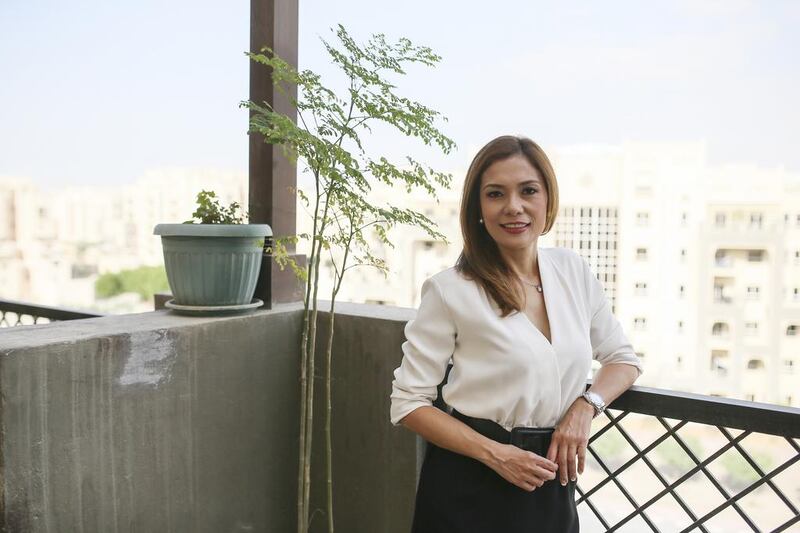If you’d asked five years ago where Monique Wilson, 45, from the Philippines, saw her future self, a business owner in the UAE likely wouldn’t have been her response.
She moved to Dubai three years ago working for a moving company, having been in the logistics sector for nearly two decades. “I realised it was difficult for a woman to rise up the ladder, so I came across [importing handbags] rather out of the blue when I couldn’t find anything here to suit my taste,” she said.
Ms Wilson is a woman who likes basic styles, and so she began ordering a few bags for herself from her home country of the Philippines. “And that’s how it all started,” she said.
With only Dh10,000, she purchased 40 bags one year ago creating LokaLoka. The order arrived on her birthday in October, selling out to friends almost immediately. “After that, I ordered 50 bags that were purchased by friends of friends,” she said.
With the third shipment the entrepreneur looked to push purses at various bazaars in Dubai, particularly the Marina Souq Market. “I’ve been lucky to be given a break by the market and last month, I was overwhelmed to see other shoppers coming back to the souq wearing my bags,” she said.
__________
Free advertisement
■ For SMEs who want to place an ad free of charge visit: https://www.thenationalnews.com/small-business-ads
__________
This grass roots business has helped Ms Wilson turn her purse hobby from a part-time job to a full-time operation, quitting the logistics company in September. “It reached a point that I could not juggle both my day job and the bags,” she said.
But don't think that this dream come true has been all plain sailing. As the company began to expand, Ms Wilson looked to source from another supplier in the Philippines. Since she is located in Dubai, she does everything online – including seeing produced samples via photos sent through email.
She reviewed the pictures and gave the OK for 500 wallets and 100 bags to be produced. Ms Wilson usually takes one item from each shipment to run a quality assurance test – basically using a purse or wallet for one week. “My mistake was that I went ahead and placed them on the shelf because of the heightened interest,” she said.
The zippers did not work and credit cards could not fit into the slots. Ms Wilson tried to do a recall of sorts, contacting as many buyers as she could to get the merchandise back for a refund or a new item. “It was all part of the research and development/learning phase,” she said. It was a mistake that cost her about Dh8,000.
And in the digital age you’d think Ms Wilson was rushing to increase LokaLoka’s market share. However, using host sites to sell goods can be expensive. “I’ve been approached by online shops, but I couldn’t participate as much as I wanted because their commission is quite high,” she said.
These sites charge a commission of up to 40 per cent, meaning Ms Wilson would have to increase the price of her goods as production and shipping totals half of the current cost of merchandise. “I would have to significantly mark up the bags which isn’t fair [to the customer],” she said.
The evolution of LokaLoka’s business has also crept into a new distribution pattern with orders coming from the US, Australia and Singapore. She has three different styles of vegan totes on offer including the Classic (Dh285), Tarcila (Dh285) and Vanessa (Dh300) while also carrying the Alexa Crossbody (Dh200).
However, one of the biggest surprises is the demand she received from the country that actually manufactures the popular items. Ms Wilson now has orders for about 30 bags a week from the Philippines, which has pushed her to keep stock in both Dubai and Manila.
Ms Wilson sells about 90 totes in a month, but anticipates to increase that figure by 50 per cent over the next year with the help of her new camel hide line. This new offer will retail for Dh500 to Dh1,500 per bag. “There are so many avenues to work on with camels as it isn’t as known as cow hide, meaning many opportunities for marketing,” she said adding that camel hide was more “durable than any other skin in the world”.
The business owner said that she wanted to do something that was inspired by region. “Not only are we trying to promote the local material in this region, but I personally believe in the durability of [camel] skin,” she said. “If camels can withstand the raging desert heat – how tough can you imagine their skins can be? And yes, they’re 10 times tougher than cow skin.”
LokaLoka buys the camel leather directly from Abu Dhabi’s Al Khaznah tannery, a firm that has only been around for about five years. “The tannery is basically new so we’re helping each other out,” Ms Wilson said. “It’s my way of offering to show this region my own appreciation.”
lgraves@thenational.ae
We are on the lookout for SME success stories. If you want to have your business profiled, contact us at business@thenational.ae
Follow The National's Business section on Twitter





